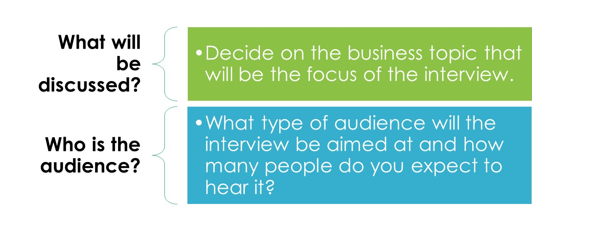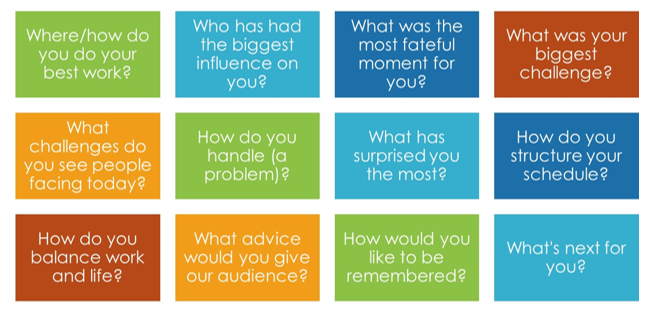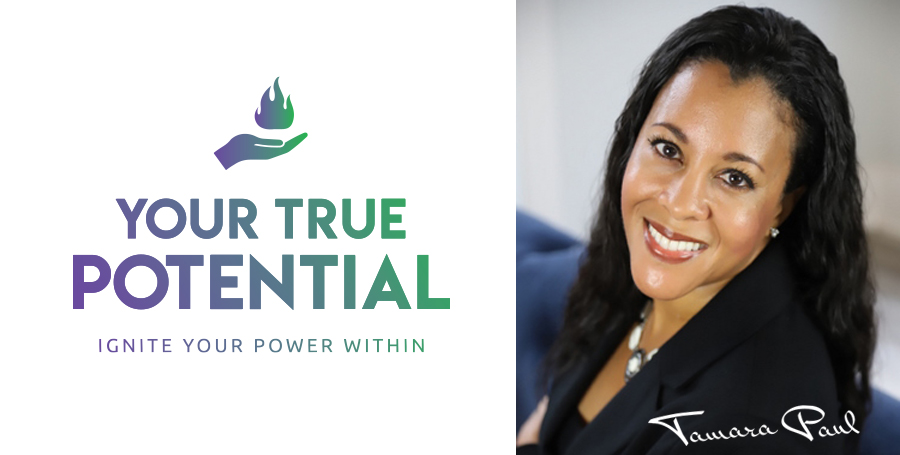Welcome to
Find and Interview Influencers Like a ProIncrease your reputation and boost your business
Module Two
How to Secure and Prepare for Your Interview
Once you have a list of key influencers with whom you’re actively engaged, you need to choose your first prospective interviewees and start thinking about how you will approach them for the interview. In order to conduct a productive interview that meets your marketing objectives, you’ll need to create a proper plan for carrying out the interviews.
First, organize the background of your interview so that you can communicate this to the interviewee. They’ll have a few questions in their mind and you should have good, solid answers prepared. They will want to know:

- What will be discussed? Decide on the business topic that will be the focus of the interview.
- Who is the audience? What type of audience will the interview be aimed at and how many people do you expect to hear it? You may want to offer some information about your subscribers and information.
When you contact a potential interviewee through email, phone, or in-person, use the research you’ve already done to talk to them. Make it personal, addressing them by name. At this point, they should at least have some idea of who you are through your interactions so that your contact and request is not completely out of the blue.
Give the potential interviewee the information above. Explain to them the objectives and goals of the interview. Ask them if they have any further questions about it and remember that you’re asking for the interview. Even though you may see no reason why they would decline, it’s not a given that they will agree to the interview. Approach potential interviewees humbly and keep in mind that you’re asking them for a favor.
Although this seems like a great deal of information, you should make your communications as short and concise as possible. Your influencer is likely to be a busy person. An overly long email that’s full of text is more likely to sit in an inbox unread than one that gets right to the point.
Setting up the Interview
Once you’ve connected with your influencer and they’ve agreed to the interview, it’s time to start preparing.
First, confirm the essential details of the interview. Be very clear on the time, date, and contact information. If you’ve set up the interview in person or over the telephone, send a confirmation email so that the details are all in writing. Try to make sure that the interviewee understands when and where the information will take place.
Before the interview, confirm the interviewee’s basic information. Confirm their bio, history, and how they want to be introduced. No matter what the focus of your interview, you should give the interviewee a chance to plug whatever they’re currently up to. Ask them if, in addition to your topic, there is anything else they’d like to talk about, such as their new product launch or social media page.
Creating Your Questions
You should always prepare a good list of questions before the beginning of the interview. These should be open-ended questions that allow the interviewee to expand and talk at length. The best open-ended questions are “how” questions. When you ask someone how to do something or how something went, the answer will always be somewhat detailed.
Try to put yourself in your audience’s shoes. What would they like to know about the interviewee or the topic? Try to anticipate what the audience would like to know and write your questions on their behalf.
Seasoned interviewers recommend writing a mix of pointed vs. light-hearted questions. It’s good to offer “tough” pointed questions. For example, a marketer may say that it’s good to create an elevator speech for meeting new people. You might say something like, “Some people might feel like that’s not very genuine. How can you do that so that you make sure you’re still being real with the person?” This sounds somewhat contrarian, but it really just challenges the interviewer to give the audience a deeper understanding.
However, if you ask nothing but pointed questions, your interview might be a little stressful for the interviewee. This is why it’s good to balance out your interview with fun, lighthearted questions.
You can also ask “obvious” questions like, “Our listeners probably already know this, but can you explain what the purpose of marketing is?” These extremely basic questions are nice because they allow your interviewee to express their own point of view.
Another great strategy is to ask short, simple questions, and then prepare longer follow-up questions. It can seem like a bit much to hit someone with a detailed, long-winded question out of the blue. But if you ask a simple question and then follow up with a more detailed question, you can get more insight into the person’s ideas while the first question sets the stage for the second one.
You can also include hypothetical questions in your interview. These are questions that ask about that future. They can be “what if” questions. You could also ask things like, “If you could go back in time knowing what you know now…?”
Here are some great sample questions that you can customize for your interview:
- Where and how do you do your best work?
- Who has had the biggest influence on you?
- What was the most fateful moment or turning point for you?
- What was your biggest challenge?
- What challenges do you see people facing today and what can they do to overcome them?
- How do you handle (a common problem)?
- What has surprised you the most along your journey?
- How do you structure your daily or weekly schedule and why?
- How do you balance work and life (or different aspects of either)?
- What advice would you give our audience (on this topic)?
- How would you like to be remembered? What do you feel will be your legacy?
- What’s next for you?

Other Considerations
Consider the environment where the interview will take place. Decide how you will record it. Atmosphere can have an effect on the interview and you want the interviewee to be as comfortable as possible.
Set up boundaries with the interviewee. Are there any topics they’d prefer not to talk about? Are there any areas of your topic that they’re not knowledgeable about or comfortable with? Discuss this beforehand so the interview doesn’t take a wrong turn and require you to edit parts out.
Once all of this has been decided, you should send the interviewee a detailed list of topics you’ll discuss. It’s also a good idea to send them the actual questions you will ask. They can prepare their answers ahead of time and also let you know if there are any questions they’d rather skip.
Finally, give the interviewee an idea of what to expect post-interview. For example, tell them that you’ll give them a review copy before it gets published in case they want to change anything. Let them know where and when the interview will drop and, when it’s published, provide them with a link or download.
Treating Your Interviewee with Respect
An important part of interviewing is treating them as an expert. First of all, respect their time and space. Set a time limit for the interview and stick to it. If you find yourself running out of time during the interview, you should drop some of the weaker questions rather than running overtime. Remember again that the interviewer is doing you a favor.
You should also be organized. Do a practice run on your own to make sure all of the technological aspects run smoothly. Do everything you need to do well in advance so that you arrive at the appointed time and place prepared and ready to go. Don’t make the interviewer wait.
You should know as much as possible about the interviewer. You may ask basic questions about the interviewer for the sake of your audience, such as, “For our audience members who may not know, tell everyone exactly what it is you do.” But you yourself should know exactly what the person does. You should know as much detail about them as possible; otherwise, you may insult them.
Finally, it’s a good idea to read or listen to other interviews that the person has done in the past. This will give you an idea of what to expect, make you even better informed about them, and offer some ideas of directions to take your own interview.
Activity:
- List 2 focus areas or topics for interviews you’d like to conduct.
- List 5 questions you could ask around the 2 previous topic areas.
A Word
From Tamara
As an entrepreneur myself I completely understand the stress, anxiety and frustration around launching or growing a business. I also know the rewards and life style change the hard work can provide you if you stay focused. I am here to inspire and motivate you to push forward. The fact that you’re investing in your business education let’s me know you’re in this to win. Rest assured I’m here to help you…. These courses are set up to help you understand the basics. To dig deeper into your specific plan of action we will discuss where you are, where you want to be, eliminate any blocks preventing you from getting to the next step and create an action plan.


